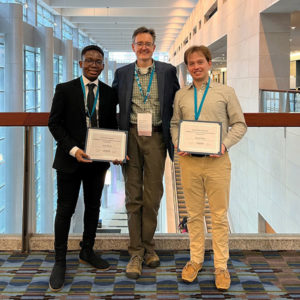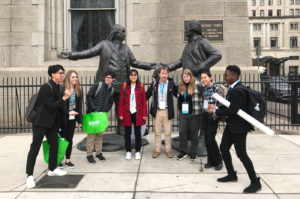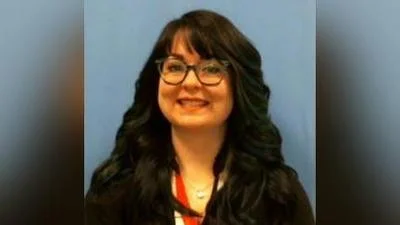A group of eight Wooster students accompanied Dr. Mark Snider, Robert E. Wilson Professor of Chemistry and Biochemistry & Molecular Biology, to Philadelphia last month to present the results of their research at the National Experimental Biology Meeting, with two of those students coming away with an award in the National American Society of Biochemistry & Molecular Biology Undergraduate Poster Competition. All the presenting students are majoring in Biochemistry and Molecular Biology.
Since 2010, five Wooster students have won honorable mention awards, but this year, Joel Brown ‘22 won the top prize with a cash award of $500, and Robby Beal ‘22 won an honorable mention prize. It is the first time a Wooster student has won the top prize in the poster competition, according to Professor Snider. The students competed in Category 5 – Proteins: Structure and Enzymology.
The following students presented at the National Experimental Biology Meeting, along with Brown and Beal: May Hlaing ’22, Sai Khal ’22, Emilee Haines ‘22, Lily McLean ’22, Zoë Semersky ‘23, and Sam Belsky ’23.
Snider, who served as a judge for the competition but recused himself from the discussion of his own students’ work, was able to listen in on how Wooster students’ presentations were discussed among the other judges. He was particularly proud of his students upon hearing comments like, “The passion and the ownership of these Wooster students for their research is phenomenal,” and “Is Wooster a research university? Their students are doing experiments that I thought only possible by graduate students with large research labs and funding.”
Brown, a biochemistry and molecular biology major, remarked about how unique the opportunity Wooster and the Biochemistry and Molecular Biology department provides its students to present original research like his.
 “When I spoke to a grad student at the conference, they were surprised that we were able to perform undergraduate research and even more surprised that it was a requirement before we graduate,” said Brown. “The grad student then proceeded to say that having this experience before coming to graduate school would have been very helpful.
“When I spoke to a grad student at the conference, they were surprised that we were able to perform undergraduate research and even more surprised that it was a requirement before we graduate,” said Brown. “The grad student then proceeded to say that having this experience before coming to graduate school would have been very helpful.
“The more rewarding outcome of this program was forming close relationships with the faculty,” said Brown. “Through my many conversations with them I think I have a good idea on what it means to be a good scientist. Interestingly it is not only about the work you do in the lab. Being a good scientist involves being honest with your data, having the ability to communicate your ideas and findings very clearly, being open for feedback and also being involved in creating a welcoming community and environment in order to encourage more people to dive into research.”
Snider seconded those remarks by commenting about how collaborative the research process is at Wooster, especially when it comes to Independent Study.
“While I may choose the overall lab direction, each of my research advisees carves their own path in making progress toward our overall goals of understanding the complex enzymatic mechanisms bacteria have evolved to degrade contaminants in the environment,” Snider said. “I learn from my students as much as they learn from me, and that is exciting. I was proud and delighted to learn that several of my students’ dedication and deep understanding was recognized at this national forum.”
Beal, who also competed as an athlete on the Wooster swimming & diving team, said, “Having the opportunity to provide a spotlight to Wooster and the BCMB program at this conference was an honor. Being able to showcase my success at a national level also showcases the strength of Wooster.”
He also remarked about how Independent Study sets Wooster apart. “We all graduate with not only a degree, but a self-designed, self-performed project that becomes a steppingstone to the next place in our lives. The I.S. experience displays our interests, our ability to dedicate to a yearlong endeavor and to communicate complicated ideas to peers and faculty. The BCMB faculty members mentor with the hope of seeing us develop as students, but more importantly, as researchers and diverse individuals well suited for whatever careers we may choose.”

The group of students worked individually on their specific research in the year leading up to the conference, but also met together to work on their presentations and offer feedback to their fellow students.
“The curriculum for BCMB majors at Wooster trains us in a step-by-step manner to become well-trained scientists and the liberal arts education teaches us how to empathize with others,” said Hlaing, who would have placed fifth in the poster competition, just missing an honorable mention selection. “The Independent Study serves as a mini graduate program and the hands-on training by the advisors who truly care about our wellbeing and create the best environment for us to engage in scientific projects we are passionate about.”
Original source can be found here.


 Alerts Sign-up
Alerts Sign-up